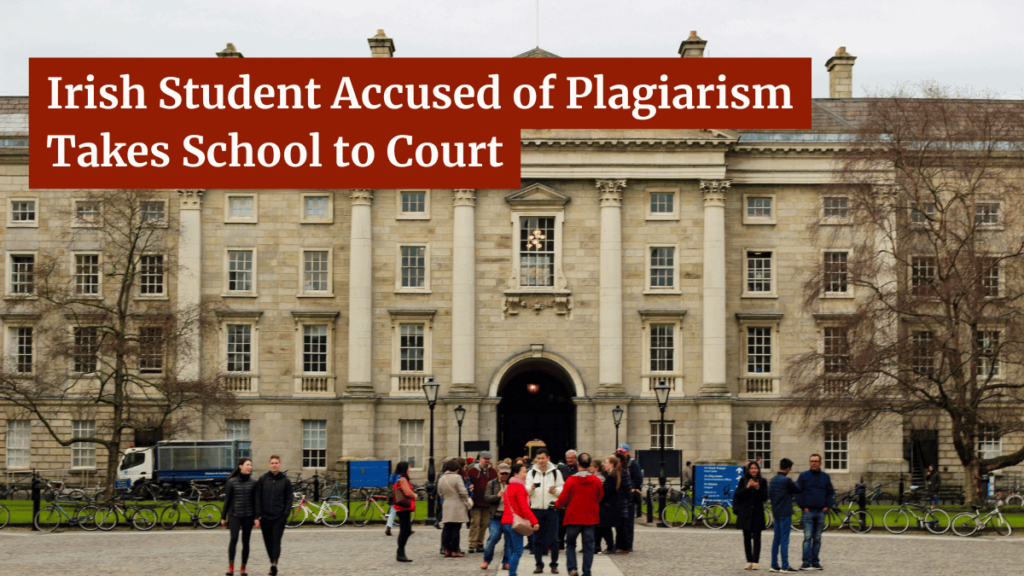
An Irish university student has filed a lawsuit against his school, seeking to quash the school’s finding that he is unfit to practice in his chosen profession.
The news comes from an article by Paul Neilan in the Irish Times.
The student in question was accused of plagiarism during an exam. Although the exam allowed students to bring their own notes, the student brought in another student’s notes instead.
He claimed he was unaware that he had been transcribing directly from another student’s work and apologized for the infraction. However, the school decided that even if the plagiarism was unintentional, the exam paper was inadmissible.
If he retook the exam, his grade would be capped at “pass.” He agreed to this, thinking it was the end of the matter.
However, the university then found that his record contained other complexities. These included another incident of plagiarism, a falsified attendance record and misrepresenting information to the school in correspondence related to college fees.
From there, the school took the matter before its fitness-to-practice committee, which recommended that he be withdrawn from the program in November of last year. The student appealed the decision, but the University upheld it in February of this year.
The student is seeking to overturn this decision. He claims that the school’s response was disproportionate and that the disciplinary committee, not the fitness-to-practice committee, should have handled the matter.
The court, for its part, is allowing the case to move forward. To protect the student’s identity, neither the student nor the school is named.
The case is a stark reminder that student litigation of disciplinary matters is becoming more common, and schools must be prepared.
Understanding the Case
The case is the latest in a long-running trend of academic misconduct cases being moved into courts of law.
Increasingly, when students are unhappy with the outcomes of disciplinary hearings, they file a lawsuit, hoping the court will overturn the decision. However, historically, at least, that has rarely worked.
The reason is that judges are reluctant to overturn decisions made by academic experts. They usually find that the school is best qualified to make that decision. Without clear evidence of wrongdoing or some violation of the school’s written policy, it’s difficult to get such a decision overturned.
However, that doesn’t stop students from trying.
This story is unusual because the student doesn’t appear to dispute the allegations against him. Instead, he’s challenging the school’s decision to hear the prosecute the case through the fitness-to-practice committee and not the regular disciplinary process.
This approach can have a much greater impact on his career. Even if the student attends another school, this finding could prevent him from getting placement in his chosen profession.
Because of its severity, the system is used to address students who may harm the public or their profession. From the university’s perspective, the student’s repeated honesty infractions meant he was a potential danger to his profession, prompting them to take this route.
However, the student claims that this was not the proper venue and that allegations of plagiarism are typically handled through the disciplinary process. However, that ignores the other alleged infractions. Those paint a picture of a student with significant issues with honesty and integrity.
The school can most likely defend its decision in this case. There’s enough history here to raise serious concerns about ethics and integrity. However, it’s still a major problem for other schools, especially as litigation becomes more common and AI becomes a bigger factor.
A Bumpy Future
The challenge schools face here is a complex one. Students suing schools has been on the rise for decades.
To be clear, these aren’t just lawsuits over disciplinary issues. Students have sued over tuition reimbursements, allegations of discrimination, alleged overcharging of students and much, much more.
In fact, of all the reasons students sue universities, disciplinary action may be one of the less common.
That said, it is still an issue on the rise, and, as this case shows, it’s a global phenomenon.
This issue crashes into another trend, the rise of AI in the classroom. Looking back to Ireland, 37 percent of students investigated for academic misconduct at one school were suspected of having used AI systems inappropriately.
Though “old-fashioned” methods still made up most cases, that percentage is only likely to grow. Though AI detection seems to be improving at least some, false positives are always a concern. Without knowing how or why an AI detection system made the determination it did, it can be difficult to prove beyond a reasonable doubt that a work is AI-generated.
That is a problem for schools. It’s not just good enough to prove it for the purpose of the classroom or the school. They must consider how to prove it in a court of law. That is often a much higher bar.
While that’s not what happened in this case, the story highlights the increase in litigation and the growing willingness of courts to hear those cases. Combine that with the challenges AI brings, and it’s a recipe for destruction.
Bottom Line
In this case, I feel confident that the school has enough evidence of unethical behavior to prove its point. Though I agree referring a case to the fitness-to-practice committee is an extreme step, this appears to be an extreme case.
However, schools need to consider how they will prove these cases if they are called to do so in court. That’s going to be especially tricky with AI cases.
Still, the fundamentals are the same. Have thorough, written policies and follow them closely. Ensure that those policies give students a fair chance to contest the allegations against them and a way to appeal decisions. Then, ensure those policies are followed thoroughly every time.
With AI, things get thornier. It will take a proactive approach to detect when AI is being used. If you can’t reliably determine when it’s being used, any boundaries you set around it become meaningless. Any enforcement of those boundaries becomes fraught, ethically and legally.
As such, it’s important to remember that any policy, procedure or rule we create can be tested in a court of law. It’s up to us to ensure that those institutions hold up when they are.
Note: Though the photo above features Trinity University, which university is involved is unknown.
Want to Reuse or Republish this Content?
If you want to feature this article in your site, classroom or elsewhere, just let us know! We usually grant permission within 24 hours.
